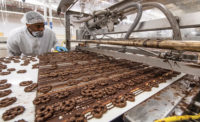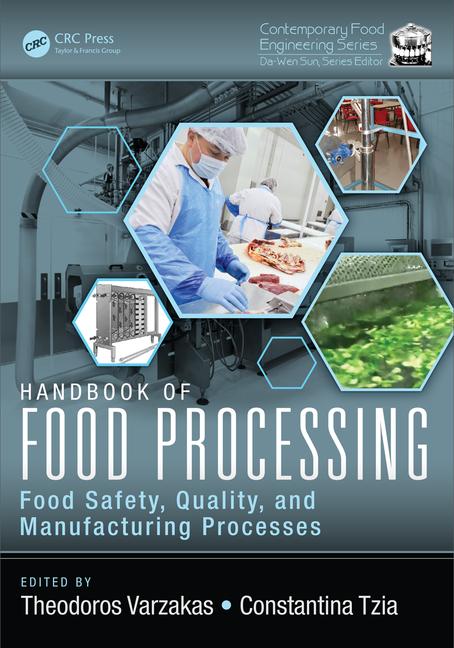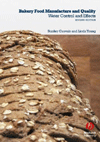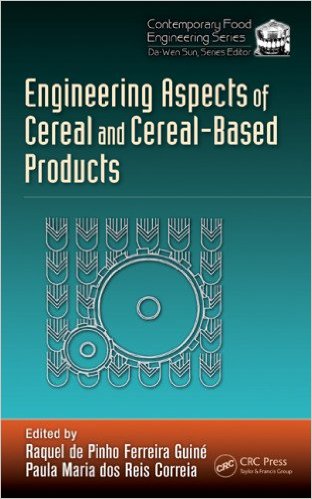Contract Manufacturing Close-Up
This year’s source book breaks out capabilities in 20 confectionery categories.
Welcome to Candy Industry and Confectioner magazines’
second Contract and Private Label Manufacturing Source Book — your
guide to the world of confectionery contract and private label
manufacturing. To compile this resource, we invited
confectionery manufacturers throughout the
world to indicate their capabilities. We then assembled the information in
an easily digestible form.
This year our Source Book boasts a 25 percent increase
in the number of processors included vs. last year. A total of 123 contract
and private label manufacturers are represented here, with 60 percent
located in the United States, 8 percent in Canada, and 7 percent in Mexico.
Twelve percent of manufacturers in this Source Book are located in Europe,
and 6 percent hail from Australia and New Zealand. Other regions of the
world represented include India, Asia, the Middle East and South America.
By definition, contract manufacturing allows
confectionery companies to enter additional markets at home and abroad via
contracting arrangements with manufacturers that have excess production
capacity. For example, a Canadian manufacturer could market its
confectionery items in China via a contract manufacturing arrangement with
a confectioner based in Asia — and vice versa. Private label
manufacturing allows confectionery companies to compete directly on the
retail shelf with other confectionery companies anywhere in the world.
Both arrangements — contract manufacturing
and/or private label manufacturing — mean that certain processors are
available to manufacture another confec-tionery company’s products
under contract. Consequently, they are not differentiated in this Source
Book. Also, processors with capacity to contract/private label manufacture
sugar-free products in any category have been indicated with an asterisk.*
To compile the 2006 Source Book, Candy Industry and Confectioner invited processors with
capacity for contract manufac-turing and/or private label manufacturing to
detail their capabilities in 20 different confectionery categories. This
Source Book includes contracting availability for chocolate (bars, enrobed,
molded and hollow molded); chewy candy (caramels and taffy);
energy/snack/nutraceutical bars; fruit roll-ups; gums (cut and wrapped,
stick and tablet); gummies — i.e. bears, worms; hard candy (breath
mints, candy canes and lollipops); interactive/novelties; jelly beans;
licorice; marshmallows; nut brittle; and panned
(chocolate and sugar).
Contract manufacturing
As it was last year, chocolate is the most popular
category for contract manufacturing; 70 percent of processors with
chocolate capabilities can manufacture molded pieces, and 64 percent have
capacity for enrobing. Other types of chocolate produced under contract
include chocolate bars, mentioned by 55 percent of processors, and hollow
molded, which can be done by 50 percent.
Our survey indicates that panning capability is widely
available as well. Most processors have the capacity to contract
manufacture panned chocolate and panned sugar products.
Chewy candies can be produced under contract by 43
percent of processors in the Source Book. Of these, four out of five will
manufacture caramels, and 60 percent have capacity for taffy.
Two of five processors report having capacity to
manufacture hard candies; most of these can produce lollipops and breath
mints. Twenty-four percent can produce candy canes.
One in four processors can contract manufacture gums;
cut and wrapped are offered by 72 percent, and most can produce tablet and
stick gum.
Gummies, marshmallows, and energy/snack/nutraceutical
confectionery items can be produced under contract by one in four
processors. Contract manufacturing capacity for nut brittle,
interactive/novelties, jelly beans, and fruit roll-ups is less common.
Private label
Chocolate is also the most popular category for
private label manufacturing, which 67 percent of processors offer. Three of
four of these companies have the capacity to mold and enrobe chocolate for
private label; 61 percent have capacity for chocolate bars; and 48 percent
can hollow mold chocolate for private labels. Most processors can produce
panned confectionery items for private label; 64 percent, panned chocolate;
and 48 percent, panned sugar items.
The capacity to produce private label chewy candy is
available from 42 percent of processors, with 82 percent of these
specializing in caramels and 60 percent in taffy.
Private label hard candy production is available from
44 percent of manufacturers; most processors can produce breath mints and
lollipops; 27 percent have production capability for private label candy
canes.
One of four manufacturers will produce private label
gums; cut and wrapped is the most popular item. In addition, most can
produce stick and tablet gum.
One in four processors has the capability to private
label manufacture marshmallows, gummies, and energy/snack/nutraceutical
products. Jelly beans, nut brittle, interactive/novelties, and fruit
roll-ups can be contract manufactured by a smaller pool of companies.
Sugar-free
Breath mints are the most popular category for
sugar-free manufacturing — 42 percent of processors have this
capability. Chocolate is the second most popular item for sugar-free
production; one in three processors can provide some form of sugar-free
chocolate.
One in four can create sugar-free chewy candies, hard
candy and panned. One in 10 has the capability to manufacture sugar-free
gum, sugar-free energy/snack/nutraceutical confectionery, and
sugar-free gummies. Even fewer manufacturers report the ability to satisfy
requests for sugar-free interactive/novelties, marshmallows, fruit
roll-ups, nut brittle and jelly beans.
Company Profile:
Sweet City Inc.
To understand Sweet City
is to understand a flexible and multi-talented, customer-friendly candy
company. Ten years young, Sweet City, Inc. wears many hats very well:
contract manufacturer, importer and nationwide distributor of U.S. branded
and imported Sweet City candies, in both bulk and many varieties of
packaged candies. Innovation is prime at Sweet City, as it determines new
candy ideas and presentations in-house, then develops and designs them
in-house utilizing its own engineering and graphic arts teams.
Products
“Products” at Sweet City are actually
products and programs. This includes bulk candy, peg-bag candy, laydown bag
candy, in and out programs (including seasonal), and many pallet programs with display-ready cartons. Sweet
City has developed what it believes is the “hottest selling new peg
bag line in the country,” known as the “Remember When Old
Fashioned Candy Shop.” This is the first time that a large group of
old-fashioned candies is available, from one source, and under one graphic
banner. Turnover of “Remember When” bags has achieved 47
percent during its first week in stores. It also appears that the line does
not cannibalize store sales from other product lines. Overall, product
lines are extensive and are driven by the retail visual acceptance, retail
price point, consumer value and estimated salability. Every new product
must pass these tests.
Production Capabilities
Sweet City’s 60,000-square-foot, climate- and
humidity-controlled distribution center in Virginia Beach, Va., is the
origination point for shipments, and is the headquarters for Sweet City.
Retailers that have had bulk candy and switch to Sweet City typically free
up about $2,000 per fixture, as there is no need for the storage of great
amounts of candy under candy fixtures; Sweet City also offers one day order
turnaround.
Packaging Capabilities
Sweet City’s brand (and the private label brands
it can produce for retailers) is available in peg and laydown bags as well
as tubs and various other packages. Self-service bulk candy supplied by
Sweet City is available in a disposable bin program or in 15-pound boxes
from which fixture bins are filled. All Sweet City Bulk Candy is
individually wrapped, a movement that Sweet City has spearheaded.
The new “Remember When Old Fashioned Candy
Shop” peg bag line uses printed film bags for maximum impact, and is
so strong visually that the suggested retail price of both the 99-cents and
$1.49 offerings are often sold at $1.19 and $1.69 to $1.99, respectively.
“Magic Jars” is what Sweet City calls its
large jars of Orange Slice Jells and Assorted Fruit Slice Jells, so named
because it is not 100 percent sure just why they sell so well. The 8-inch
tall jar contents — 3.17 pounds of Jells that retail for $2.99 to
$3.99 per pound — create an immediately recognizable value at a $4.98
suggested retail price. Sweet City’s newest line, scheduled for
production in January, consists of 6-inch-high tubs and is aptly named,
“Tall Tubs.”
Sweet City always has a variety of products and
packaging in development and its people are always available to work with
buyers for their special projects.
Additional Capabilities
Because it believes in offering its candies and
programs at the most competitive prices possible, and in light of the
varied retail formats that sell candy, Sweet City offers all products at
what is referred to as Dead Net Prices. Should a buyer need promotional
funds, or funds for any purpose, that money can be added into the Dead Net
Price. The company believes this is the only method that keeps the product
cost low to all those that don’t need funds paid or rebated.






